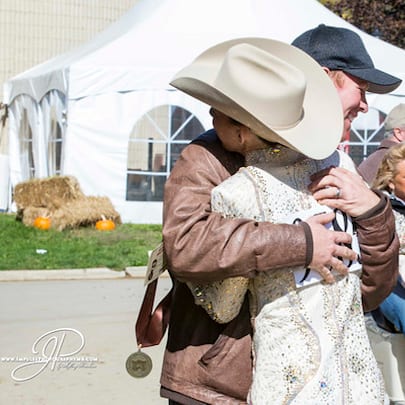It’s that time of year again where I cringe every time I hear about resolutions…a.k.a, the average person’s “To Do List” for the first week in January. This year, I actually have something that would qualify for a resolution if the resolution is to make themselves and others happy in 2014. What’s even better about this resolution is that I have put it to the test, and I am happy to report that it works!
In August, I read an article about an informal survey pertaining to college athletes that was conducted by Bruce E. Brown and Rob Miller of Proactive Coaching. This study caught my attention not only because I could understand it (translation…they left out all of the scientific and statistical stuff), it caught my attention because it was simple and made sense.
In this 30 year study, they asked athletes what their worst memory was from playing youth and high school sports. The athletes’ overwhelming response was, “The ride home from games with my parents.”
Ouch! I would have thought their response would be that their worst memory was the hard training, fierce competition, or maybe even having to compete against your BFF. But no, it was the ‘car talk’ on the way home that they disliked the most.
The same athletes were then asked what their parents said that made them feel great after competing. The overwhelming response was…
“I love to watch you play.”
Armed with this information, I thought this would be a great topic for GoHorseShow, however, it would have been a very short article since I just gave you all of the information. So I decided to take this idea out for a five month test drive and find out how and why this is so powerful, and if it would work beyond a parent-child relationship.
This concept works because it eliminates dual relationships
A Dual, or Multiple Relationship in psychotherapy refers to any situation where multiple roles exist between a therapist and a client. To put this into a situation that a horse show person can relate to, a Dual Relationship in this case would be a parent acting as a horse trainer. If you are a parent, or a significant person in your equestrian’s life, chances are, you started off as a parent first. You know, the one who puts the band-aid on the boo-boo and says that everything will be okay. If Jimmy has a bad day in his trail class and he goes off pattern, he doesn’t need you to tell him that he needs to focus and remember the pattern. He needs you to hug him and tell him that no matter what the outcome is, you love watching him ride.
This concept works because it rewires our brain
Like I said, I test drove this concept, and I can tell you that it will make a difference in your life. Our brain is an organ, just like our heart, lungs and kidneys and it basically has two jobs. The first job is to learn things as fast as it can, and the second thing is to automate the things that it learns. That is why so many of our emotional outbursts are ‘knee-jerk’ reactions. We are on autopilot, and when something happens, our brain determines how we react. When we start to make a change in our behavior, our brain says, “Oh, okay, now instead of getting mad when things don’t go the way you want, you are going to love whatever happens.” The brain doesn’t care what the output is, it learns and automates things, so why not automate good feelings instead of negative feelings. I tried this out with all kinds of things that used to drive me crazy such as:
I love hearing you burp.
I love cleaning the kitchen floor.
I love it when I ride and it is windy and cold out.
I love it when my horse spooks at nothing.
I love it when my computer crashes and I lose all of my work.
At first, I had to really pay attention and summon up a nice feeling when doing something I didn’t really enjoy, like taking out the garbage. As I was doing the task, I would wait until I had a good feeling, then I would think to my self, “I love taking out the garbage.” In order to really seal the deal, I would strengthen the connection between love and garbage by thinking about all the good things that taking out the garbage does for me. It makes the house smell nice, I love the big garbage cans that we have, and I like to go out for some fresh air. I can honestly say that doing these unpleasant things now brings a smile to my face, and I don’t get that wrapped around the axle feeling that I had before.
This concept works because it starts from the heart
Just try this one out–when you think of something that you love, it can be a person, horse or even really nice shoes, where does that feeling seem to be coming from? For most people it comes from the heart. When people come from a place of gratitude, chances are, they will feel more open and experience more happiness and joy in everyday life.
This concept works because you get what you focus on
We are bombarded with millions of bits of sensory information every second, and our brain filters out what it deems to be important based on our current awareness. That is why you may have noticed that when you are feeling really great, everything around you seems to be that much better, and vice-versa. When we train our brain to pay attention to the good things and feelings in life, your brain will sort more for those things, which just allows more good stuff to enter your life.
This concept works because it makes the other person happy
If you have been around other people, there may be little things that they do that can get on your nerves, and like it or not, you probably have a few moves that will push their buttons faster than a New Yorker in an elevator. If you are not sure what I mean, I am talking about the leave the seat up, coffee slurping, clothes all over the floor type of things. When you can take a step back and think, “I love watching you drink your coffee” instead of throwing daggers at them with your eyes, it will have an amazing effect on them, since they probably have developed their own not-so-positive reaction to your reaction.
When you change the way you respond to others, you will change their response back to you. Over time, old habits and patterns will transform, and what used to make them cranky will now make them happy, and who wouldn’t want to love watching somebody be happy?
So give this a try and see if you can make it work for you. I wish you much happiness this New Year!
Kirsten Farris is a regular contributor to GoHorseShow.com and a Certified Sport Consultant, Certified Equestrian Fitness Trainer, and the Author of The Workbook for the Equestrian Athlete – A Guide to Showring Success. Kirsten and her horse, Lyles Al Lie, were the 2012 and 2013 AQHA Select World Champion in Hunter Under Saddle. For more information contact her at: kirsten@equestrianathlete.com © 2013









